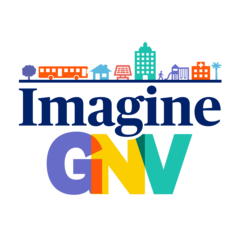Bryan Jan 12 2026 at 1:02PM on page 180
Comment on the Comprehensive Plan Draft
The City of Gainesville has been a center for business, education, government, and more for over a century, but not all residents have benefited from Gainesville's growth in the same way. lmagineGNV is a strategy to start creating a future Gainesville where all people can live up to their full potential. This strategy builds on strengths across our communities today to overcome disparities and guide growth over the next 10 years.
Summary
HideImagineGNV: City of Gainesville Comprehensive Plan
lmagineGNV - the City's latest Comprehensive Plan update - meets State guidelines but also adds new goals, objectives, and policies that aim to confront longstanding disparities to make Gainesville a place where everyone can thrive. lmagineGNV lays out priorities and actions the City will take over the next decade to invest in transformational projects and reinvest in communities that are historically left out of the planning process, including low-income and underrepresented communities. This plan uplifts policies that will expand access to affordable homes, quality education, well-paying jobs, and thriving neighborhoods.
Introduction
Learn more about our update to the Comprehensive Plan, ImagineGNV.
1. Gainesville Today
View a snapshot of Gainesville Today, including the City's current strengths and the challenges that we face.
2. Our City Government
The Our City Government chapter seeks effective coordination across all levels of government, enhancing existing partnerships, and exploring new opportunities for collaboration in governance.
3. Our Cultural Identity
The Our Cultural Identity chapter highlights the importance of reflecting Gainesville's unique identity in our parks programming, events, and our historic districts and structures.
4. Where We Live
The Where We Live chapter addresses housing in Gainesville in terms of our current stock, affordability, housing type, and quality.
5. How We Build
The How We Build chapter combines three "elements" required by Florida Statute, including: 1. Future land use, zoning, and new development, 2. Gainesville's capital improvements, and 3. Property rights.
6. How We Get Around
The How We Get Around chapter examines improvements to the City's transportation system in terms of affordability, safety, multimodal mobility (choices for walking, bikes, scooters, transit, and cars, etc), Vision Zero (zero traffic-related deaths), and planning for growth and new development.
7. Our Environment
The Our Environment chapter combines four "elements" required by Florida Statute, including: 1. Stormwater management, 2. Conservation, 3. Potable water and Wastewater Management, and 4. Solid Waste. The chapter also discusses energy and resilience.
8. Our Health and Wellbeing
The Our Health and Wellbeing chapter, which includes the required Recreation and Open Space "element" of Florida Statute, addresses health from three perspectives: physical health, mental health, and social health.
9. How We Work
The How We Work chapter tackles economic development in Gainesville through goals, objectives, and policies related to employment and jobs, economic stability, and resources for business development and small businesses.
10 How We Learn
The How We Learn chapter explores learning opportunities both inside and outside of the classroom in tandem with the City's longstanding partnership with the Alachua County Public School system.

 bubble to view comments.
bubble to view comments.
Comments
View all Cancel